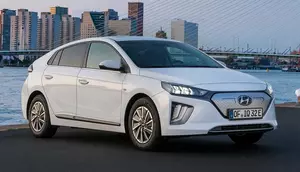
| Vehicle | Curb weight | Difference from world's smallest | Weight to power ratio | 0—60 mph acceleration ratio | Consumption ratio |
|---|---|---|---|---|---|
| 1.6 GDI |
1469 kg / 3239 lbs |
1044 kg (2302 lbs) heavier | 14 kg to 1 hp | 143 kg/s (315 lbs/s) | - |
| 38.3 kWh |
1575 kg / 3473 lbs |
1150 kg (2536 lbs) heavier | 12 kg to 1 hp | - | 197 kg/kW (434 lbs/kW) |
| Vehicle | 1.6 GDI |
|---|---|
| Curb weight |
1469 kg / 3239 lbs |
| Difference from world's smallest | 1044 kg (1044 lbs) heavier |
| Weight to power ratio | 14 kg to 1 hp |
| 0—60 mph acceleration ratio | 143 kg/s (315 lbs/s) |
| Consumption ratio | - |
| Vehicle | 38.3 kWh |
| Curb weight |
1575 kg / 3473 lbs |
| Difference from world's smallest | 1150 kg (1150 lbs) heavier |
| Weight to power ratio | 12 kg to 1 hp |
| 0—60 mph acceleration ratio | - |
| Consumption ratio | 197 kg/kW (434 lbs/kW) |

| Vehicle | Curb weight | Difference from world's smallest | Weight to power ratio | 0—60 mph acceleration ratio | Consumption ratio |
|---|---|---|---|---|---|
| 28 kWh |
1420 kg / 3131 lbs |
995 kg (2194 lbs) heavier | 12 kg to 1 hp | 151 kg/s (333 lbs/s) | 142 kg/kW (313 lbs/kW) |
| 1.6 GDI |
1495 kg / 3296 lbs |
1070 kg (2359 lbs) heavier | 14 kg to 1 hp | 148 kg/s (326 lbs/s) | - |
| Vehicle | 28 kWh |
|---|---|
| Curb weight |
1420 kg / 3131 lbs |
| Difference from world's smallest | 995 kg (995 lbs) heavier |
| Weight to power ratio | 12 kg to 1 hp |
| 0—60 mph acceleration ratio | 151 kg/s (333 lbs/s) |
| Consumption ratio | 142 kg/kW (313 lbs/kW) |
| Vehicle | 1.6 GDI |
| Curb weight |
1495 kg / 3296 lbs |
| Difference from world's smallest | 1070 kg (1070 lbs) heavier |
| Weight to power ratio | 14 kg to 1 hp |
| 0—60 mph acceleration ratio | 148 kg/s (326 lbs/s) |
| Consumption ratio | - |